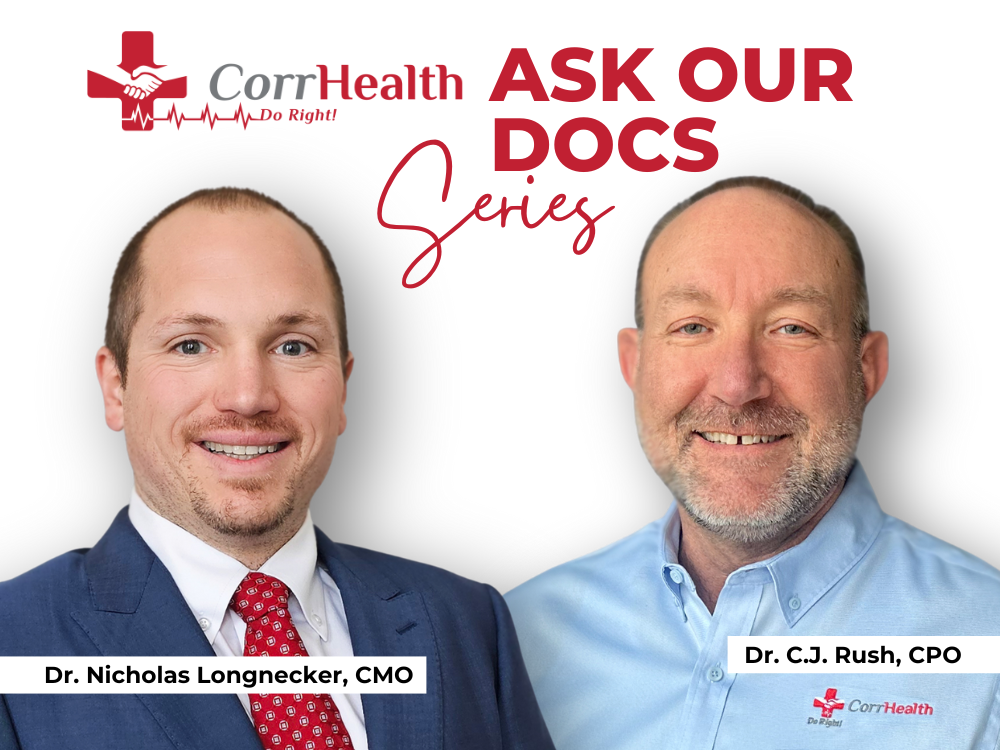Featuring Dr. C.J. Rush, Chief Psychiatric Officer, and Dr. Longnecker, Chief Medical Officer
Welcome to our first edition of “Ask Our Docs”, where CorrHealth’s medical leaders answer real, anonymously submitted questions about mental and physical health—both inside correctional care and beyond. This month, Dr. C.J. Rush and Dr. Longnecker share their perspectives on topics ranging from stress and psychiatry to heart health and emerging treatments.
Q1. Why are psychotropic medications prescribed so often if there’s no clear biological cause for mental illness?
Dr. Rush:
There’s a lot to unpack here. You’re absolutely right—most serious mental illnesses don’t have one single clear biological cause, according to the DSM-5-TR. But that doesn’t mean we don’t understand anything about the biology behind them.
Take major depressive disorder, for example. Before we had modern neuroscience, we relied on careful observation. Doctors noticed that certain medications for blood pressure, like reserpine, caused depression, while a tuberculosis drug called iproniazid actually improved mood. That connection sparked the discovery of the first antidepressants.
Fast-forward to the 1980s, when we learned that serotonin plays a key role in depression, leading to the development of SSRIs. Today, we know it’s more complex—it’s not just serotonin, but a mix of neurotransmitters like dopamine, norepinephrine, glutamate, and GABA. Modern neuroscience now helps us understand brain circuits and chemistry on a much deeper level.
So, while we may not have every biological answer, we do have powerful treatments that work, and decades of research to guide us.
Q2. How do I know if my symptoms are stress-related or something more serious?
Dr. Rush:
Stress can mimic symptoms of mental illness, so this is an important question. The difference usually lies in how it affects your ability to function.
If your stress is temporary and you can still handle your job, relationships, and daily responsibilities, it’s probably just that—stress. But if your symptoms are disrupting your life, making it hard to function, or causing problems others notice, that could indicate a more serious psychiatric condition.
Even if it doesn’t meet the criteria for a major disorder, that doesn’t mean you shouldn’t seek help. Talking with a counselor early can help prevent things from getting worse and build stronger coping skills.
Q3. How dangerous is atrial fibrillation (AFib)?
Dr. Longnecker:
AFib is an irregular heartbeat that causes the upper chambers of your heart to beat chaotically. It’s not always immediately life-threatening, but it’s serious because it increases your risk of stroke about five-fold.
When the heart isn’t beating properly, blood can pool and form clots that can travel to the brain. Over time, untreated AFib can also weaken the heart and cause heart failure.
The good news? With the right care—whether that’s medication, procedures, or lifestyle changes—most people live long, full lives with AFib. The key is early diagnosis and consistent follow-up.
Q4. What are healthy ways to cope with stress—and which should I avoid?
Dr. Rush:
Healthy coping starts with the basics: move your body, eat well, and sleep enough. The brain and body work best when you take care of both.
Other great ways to manage stress include mindfulness, journaling, creative outlets, spending time outdoors, and connecting with others. On the flip side, avoid using substances or impulsive behaviors like overspending or restrictive eating to escape stress.
The goal isn’t to eliminate stress—it’s to manage it in healthy, sustainable ways. Accept reality and own it, don’t fail to forgive yourself for not being perfect (you are only human), and find some peace (serving others is the easiest way to find peace).
Q5. Would it be possible to get cochlear implants in prison?
Dr. Longnecker:
Technically, yes—it’s possible, but it’s extremely rare. Correctional systems are legally required to provide adequate medical care, but the definition of “adequate” doesn’t always include specialized or elective surgeries like cochlear implants.
These procedures are expensive, require long-term follow-up, and are often classified as not medically necessary in correctional settings. In most cases, hearing aids are provided instead. It’s not perfect, but it’s the most practical and accessible option within the system.
Q6. What are the signs I should seek immediate help for my mental health?
Dr. Rush:
My advice is simple—don’t wait. You don’t need to check boxes or hit a crisis point before reaching out for help.
If you ever feel unsafe, disconnected from reality, or have thoughts of harming yourself or others, seek help immediately. Call 988, go to your local ER, or reach out to a crisis line. Even if you’re not sure how serious things are, talking to someone early can make all the difference.
Q7. Thoughts on GLP-1 Medications (Ozempic, Tirzepatide, etc.) for Weight Loss
Dr. Longnecker:
GLP-1 medications like Ozempic and Tirzepatide are game-changers in the world of weight management. They were first developed for diabetes, but studies show they’re also extremely effective for weight loss—often leading to double-digit percentage reductions in body weight.
For non-diabetic patients, versions like Wegovy and Zepbound are FDA-approved for obesity. These medications help regulate appetite, improve insulin function, and slow digestion, but they’re not a magic fix. They work best when combined with a healthy lifestyle and long-term follow-up.
The biggest challenges right now are cost and access. They’re expensive, and coverage can be inconsistent. But for many people, GLP-1s are giving new hope where older treatments failed.
Final Thoughts
Dr. Rush:
Ask questions. Stay curious. Your health—mental and physical—is worth understanding.
Dr. Longnecker:
And remember, healthcare is a partnership. The more you know, the better we can care for you.
If you have a question you’d like us to answer in our next issue of Ask Our Docs, you can submit it anonymously at mycorrhealth.com/ask-our-docs.







